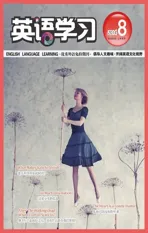Making Poetry
2014-03-10AnneStevenson
Anne Stevenson
∷王冬菊 译析
‘You have to inhabit1. inhabit: 栖息,居住于。poetry if you want to make it.’
And what’s ‘to inhabit’?
To be in the habit of, to wear
words, sitting in the plainest light,in the silk of morning, in the shoe of night;a feeling bare and frondish2. frondish: 像蕨菜叶子一样的。in surprising air;familiar … rare.
And what’s ‘to make’?
To be and to become words’ passing weather; to serve a girl on terrible terms, embark on voyages over voices,3. passing: 短暂的;on... terms: 以……样的条件做;embark: 上船。evade the ego-hill, the misery-well,the siren hiss of publish, success, publish,success, success, success
And why inhabit, make, inherit poetry?
Oh, it’s the shared comedy of the worst blessed; the sound leading the hand;a wordlife running from mind to mind through the washed rooms of the simple senses;one of those haunted, undefendable, unpoetic crosses4. cross: 一种阻碍、不幸或折磨,常用在词组bear one’s cross中。这里与cross搭配的“find”强调诗人是主动迎接并积极面对各种创作瓶颈的。we have to find.
“想要作诗
你必须置身其中。”
何为“置身其中”?
习惯于,穿着文字的衣服,坐在最浅淡的光线里,早晨的丝绸,夜间的鞋;在奇异空气中像蕨菜叶子般裸露的感觉;熟悉……罕见。
何为“作”诗?
融入和成为文字瞬间的
阴晴;为残酷的缪斯女孩儿
效力;在争议声中开始远航,
逃离自我之山,痛苦之源,
和塞壬女妖的发表、成功、发表,成功、成功、成功的嘶嘶声。
为何要置身诗中,创作,继承?
哦,这是最不幸的人们共有的
喜剧;声音带领着手;
一种文字生活在心灵之间流淌
冲刷过简单知觉的房间;
那些令人困扰、无力抵抗、毫无诗意的灾难,我们必须悉数寻见。
